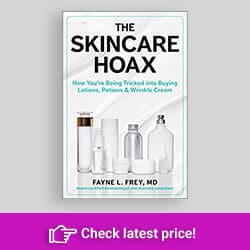by Fayne Frey, M.D., Board Certified Dermatologist and Author of “The Skincare Hoax: How You’re Being Tricked Into Buying Lotions, Potions & Wrinkle Cream”
“Does Formaldehyde Cause Cancer?”
The answer to “Does formaldehyde cause cancer?” is yes, and many people understandably have concerns. For example, a 32-year-old young mom, Erica, recently visited my office with her three-month-old daughter. Concerned about the scales on her infant’s scalp, she asked, “I tried baby shampoo but I’m afraid to continue because my friend told me baby shampoo has formaldehyde in it.” I hear this comment often; people talk fearfully about the poisonous ingredients in skincare products that cause cancer. Time to explain the facts about formaldehyde.
Formaldehyde Is a Gas
Formaldehyde gas is a known carcinogen as well as a gas. It’s included on the World Health Organization’s (WHO) Group 1 list of cancer-causing agents. I understand that sounds scary – but to put it in perspective, hot dogs, ham, sunshine, and alcohol also made the list.
People who breathe high concentrations of formaldehyde gas as an occupational hazard, such as pathologists and embalmers, do experience a slightly higher incidence of nasal cavity cancers. Formaldehyde isn’t the problem, though. Too much formaldehyde is the issue.
As the saying goes, “Too much of a good thing, isn’t”. I explained to Erica that too much of just about anything is problematic. Alcohol is a good example; an alcoholic beverage isn’t bad for you unless you drink too much. Acetaminophen, the active ingredient in Tylenol, which is great for headaches, also illustrates the point well. Unfortunately, too much acetaminophen can cause liver failure and possibly death.
Formaldehyde Is a Natural Substance
Formaldehyde exists in every living organism. And all of us exhale this gas with every breath. Formaldehyde is also found in items like apples, pears, vegetables, meat, fish, coffee, and even alcoholic beverages.
Shampoos and skin care products often contain tiny amounts of formaldehyde-releasing compounds that act as preservatives; they aren’t actually formulated with formaldehyde. These formaldehyde-releasing ingredients effectively prevent the overgrowth of microorganisms in the product. Without it, the rim of your baby’s shampoo bottle cap might turn green or brown with potentially harmful mold or bacteria. Would you comfortably massage those organisms on your baby’s head? Probably not. Cosmetic companies formulate all their water-based products with a preservative; otherwise, microorganisms contaminate the product quickly, usually in less than two weeks.
 More Formaldehyde Facts
More Formaldehyde Facts
The minuscule amounts of formaldehyde released from these preservatives destroy contaminants. That’s a good thing. In addition, the formaldehyde released by these preservatives is chemically identical to that produced naturally in humans and animals. As a dermatologist, I worry more about the skin irritation formaldehyde-releasing preservatives sometimes cause than cancer. That said, a very small percentage of users actually experience allergic reactions to these types of preservatives. To minimize the possibility of skin irritation, manufacturers use the lowest effective concentration possible in their products.
Back to Erica and her concern about the baby shampoo. The amount of formaldehyde released when she shampoos her child’s hair is less than the amount present in a medium-sized apple or pear.
So, Is it True That Formaldehyde Causes Cancer?
Don’t Believe the Hype About Formaldehyde Without Proof. Formaldehyde-releasing preservatives found in many over-the-counter shampoos, skin care products, and liquid soaps do not cause cancer. The benefits far outweigh the dangers, so don’t allow misinformation from the media or well-intentioned friends to scare you. Sensationalism sells, and new parents are particularly vulnerable. The bottom line? Feel free to use baby shampoo – or to eat a pear!
Meet Dr. Fayne Frey, Board Certified Dermatologist

Fayne Frey, M.D., is a board-certified clinical and surgical dermatologist practicing in West Nyack, New York, where she specializes in the diagnosis and treatment of skin cancer. She is a nationally recognized expert in the effectiveness and formulation of over-the-counter skincare products, and the author of “The Skincare Hoax”. Dr. Frey is the Founder of FryFace.com, an educational skincare information and product selection service website that clarifies and simplifies the overwhelming choice of effective, safe, and affordable products encountered in the skincare aisles. Dr. Frey is a fellow of both the American Academy of Dermatology and the American Society for Dermatologic Surgery.
FAQs About Formaldehyde in Shampoo
Here are some of the questions we hear most often related to formaldehyde in shampoo products.
Q: What is formaldehyde in shampoo?
A: Formaldehyde is a chemical commonly used as a preservative in certain shampoos and other personal care products to prevent bacterial growth and extend their shelf life.
Q: How can I identify formaldehyde in shampoo ingredients?
A: Formaldehyde is not typically listed as an ingredient but rather as formaldehyde-releasing agents, such as DMDM hydantoin, imidazolidinyl urea, diazolidinyl urea, and quaternion-15. Reading the product label and looking for these ingredients can help identify the presence of formaldehyde in the shampoo.
Q: Are there any regulations regarding formaldehyde levels in shampoo?
A: Different countries have varying regulations on formaldehyde levels in personal care products, including shampoos.
Q: How can I avoid formaldehyde in shampoo?
A: If you are concerned and want to avoid formaldehyde in shampoo, look for products that explicitly state being “formaldehyde-free” or opt for shampoos with natural preservatives. Consider using organic or natural hair care products that are free from formaldehyde-releasing agents.
Q: Can formaldehyde-free shampoos still contain other harmful chemicals?
A: Formaldehyde-free shampoos can still contain other chemicals that some people may consider harmful. It’s essential to review the product’s full ingredient list and conduct research on any ingredients you are unsure about.
Q: Are there any natural alternatives to formaldehyde in shampoo preservatives?
A: Yes, there are natural preservatives that can be used in place of formaldehyde. Some common natural preservatives include essential oils like tea tree oil, rosemary extract, and grapefruit seed extract, as well as certain plant-based compounds with antimicrobial properties.
Q: Can formaldehyde in shampoo cause hair damage or hair loss?
A: Formaldehyde is primarily known for its potential to irritate the scalp and skin rather than causing hair damage or hair loss directly.
Q: Are there any alternative hair care methods to avoid formaldehyde exposure?
A: Apart from using formaldehyde-free shampoos, consider using homemade or DIY natural hair care solutions. Additionally, washing hair less frequently and opting for gentler hair care routines can also minimize exposure to potentially harmful chemicals.
FAQs About Formaldehyde in Skin Care Products
Q: Why is formaldehyde used in skin care products?
A: Like with shampoos, formaldehyde is a chemical often used in some skin care products as a preservative to prevent bacterial growth and extend shelf life.
Q: Is formaldehyde safe to use in skin care products?
A: The safety of formaldehyde in skin care products is a topic of concern. However, small amounts of formaldehyde are generally considered safe. Higher concentrations can lead to skin irritation, allergic reactions, and other potential health risks.
Q: What are the potential health risks associated with formaldehyde in skin care products?
A: Prolonged exposure to formaldehyde or its releasing agents in skin care products can cause skin irritation, redness, and itching. Some individuals may develop allergies or contact dermatitis due to formaldehyde exposure.
Q: How can I identify formaldehyde in skin care product ingredients?
A: Formaldehyde is not typically listed as an ingredient itself but may be present as formaldehyde-releasing agents. Look for ingredients like DMDM hydantoin, imidazolidinyl urea, diazolidinyl urea, and quaternium-15, as these release formaldehyde during product use.
Q: Are there any regulations regarding formaldehyde levels in skin care products?
A: Different countries have varying regulations concerning formaldehyde levels in skin care products.
Q: How can I avoid formaldehyde in skin care products?
A: To avoid formaldehyde exposure, look for skin care products labeled as “formaldehyde-free” or choose products with natural preservatives. Also, consider opting for organic or natural skin care products.
Q: Can formaldehyde in skin care products cause skin damage or aging?
A: Formaldehyde is not known for causing skin damage or aging directly.
Q: Are there any natural alternatives to formaldehyde in skin care product preservatives?
A: Yes, there are natural preservatives that can be used in place of formaldehyde in skin care products. Some common natural preservatives include essential oils like tea tree oil, rosemary extract, and grapefruit seed extract, as well as certain plant-based compounds with antimicrobial properties.
Q: Can formaldehyde in skin care products be harmful when absorbed through the skin?
A: Formaldehyde can be absorbed through the skin, and prolonged exposure to high levels can lead to health issues. However, the concentration of formaldehyde in most skin care products is generally low, which reduces the risk of significant absorption.
Q: Can formaldehyde in skin care products cause skin cancer?
A: The link between formaldehyde exposure in skin care products and skin cancer is not well-established. Its potential to cause cancer through skin contact is still a subject of research and debate.
Q: Are there any alternative skincare methods to avoid formaldehyde exposure?
A: Besides choosing formaldehyde-free products, you can opt for natural skincare routines using homemade or DIY solutions. Additionally, consider patch testing new products on a small area of skin before full application to check for any adverse reactions.
Related Articles:
- Are Natural Skincare Products Really Better?
- When Do My Over the Counter and Personal Skincare Products Expire?
- How to Fix Dry Cracked Heels?
- Let’s Be Accurate: Moisturizers Don’t Add Water to the Skin
Cover Image Source: Erick Larregui












